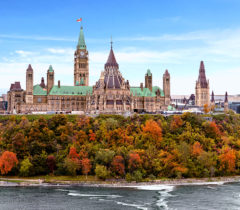As we be enter the second quarter of 2021, the Ottawa real estate market continues an unprecedented boom, fuelled by ultra-low mortgage rates, a surge in demand for more residential space and less regard for proximity to major office hubs. With an abundance of green spaces, a variety of local attractions and a stable workforce, anchored by the federal public service, Ottawa has always been an attractive Canadian city to live and grow roots in. As we enter the second year of the Global Pandemic, where huge portions of the population have been mandated to work from home, Ottawa has become even more attractive both for current residents looking for more space and for newcomers from across the country; from areas like the West where the economy has been struggling for years and from places like the GTA, where the cost of living has skyrocketed over the past decade.
However, mortgage rates are now starting to creep up, putting even more pressure on prospective Ottawa home buyers to make a move sooner than later… a trend that will likely continue as vaccination efforts ramp up and the economic recovery picks up steam later in 2021. Many Canadians are sitting on large levels of savings, having had limited spending options over the past year, so if we’re able to achieve ‘herd immunity’ with anywhere close to 70% of the population vaccinated within the next 6 months, a surge in spending could put inflationary pressure on interest rates and improve investor confidence. A higher projected rate of immigration in the next few years, to make up for shortfalls in skilled workers, will further intensify demand for all manner of housing, especially in attractive urban settings like Ottawa.
What’s Driving the Ottawa Real Estate Boom in 2021
Ottawa home prices have surged over the past six months building on earlier momentum starting about two years ago when available inventory significantly diminished creating a strong seller’s market in the Ottawa area. The immense shock of the Covid-19 Pandemic further compounded the buying frenzy in the Ottawa real estate market through the fall of 2020. Similar conditions are now reflected across many parts of Canada creating concerns of an overheated real estate market not seen since the late 1980s.
The economic drag of the Pandemic has put significant downward pressure on interest rates to keep the economy afloat, which in turn has helped hold mortgage rates at record lows. When combined with a growing demand for Ottawa real estate, with more buyers looking for more space (a trend that has been developing for the past few years and then was pent up during the spring lockdowns of 2020) year-over-year price increases for homes in Ottawa through the first quarter of 2021 have been staggering:
The average price tag for a residential home in Ottawa in February 2021 was $717,914 — an increase of 27 per cent over the same month in 2020. The average price for a condo [for February 2021] was $407,671, 17 per cent over February 2020…. “It’s definitely an exciting market, and a kind of market we’ve never seen before in Ottawa,” said Debra Wright, president of the Ottawa Real Estate Board. “It is very challenging for buyers,” said Wright. “Part of what is happening here is we’ve had pent-up demand for a number of years. Then, as the pandemic progressed, lots of people started thinking about increasing the space they have to live in,” said Wright. – CBC
Variable Canadian Mortgage Rates Likely Stable Through 2021
The situation is clearly not sustainable and economic factors are now starting to shift to prospects of growth and recovery. A poll conducted March 1-5 by Reuters had a consensus of 25 economists agreeing with the Bank of Canada’s assessment that the Canadian economy would be solid and sustainable for the second half of the year. One economist summed up Canada’s economic situation going into the second quarter of 2021 this way:
The Canadian economy soldiered through the second wave of restrictions much better than anticipated, supported by a big rebound in resource sector activity and a raging housing market…. Look for new growth drivers to kick into gear as the economy re-opens in stages through this year, leading to roughly 6% growth – a nice mirror image to last year’s deep dive. It’s not precisely a V-shaped recovery, but it’s very close. – Douglas Porter, chief economist and managing director economics at BMO
There was, however, also a consensus among the economists polled that the central bank would not likely raise interest rates this year, which would help keep variable mortgage rates in check and holding relatively steady through 2021.
Fixed Canadian Mortgage Rates on the Rise
Fixed rate mortgages, which the majority of Canadian mortgage holders opt for due to their certainty as a hedge against the possibility of rising rates, and which are influenced more by investors in the bond market, are on the rise and are projected to continue an upward trend at a moderate pace through 2021. An recent analysis by Mortgage Sandbox of the predicted trend of the 5-year Government of Canada Bond Yield, based on projections by Canada’s big banks, shows an estimated increase of about 0.3% over the remaining three quarters of 2021. This indicator of growing investor confidence in the Canadian economic recovery may tap the brakes on overheating housing markets like that in Ottawa, but it also might spur any potential buyers to lock in on a low rate now while they can, before fixed mortgage rates start to really take off in tandem with the economic recovery anticipated for the latter half of 2021.
Immigration Will Boost Economic Activity but will also Increase Demand for Canadian Real Estate
Travel restrictions, due to the onset of the Pandemic last year, closed off the taps of immigration that Canada relies on to fill vital requirements for skilled workers in many sectors of the economy. Now that vaccination programs are rapidly moving forward, the federal government is looking to make up this immigration shortfall over the next 3 years. This year, Immigration minister Marco Mendicino wants to bring in a record 401,000 permanent residents. This rate will go up to 411,000 in 2022 and 421,000 in 2023. This combined influx will make up 3.3 per cent of the population and all of these people will need somewhere to live. Typically, the majority of immigrants would land in major urban business centres like Toronto and Vancouver, but with more options to work from home that likely aren’t going to disappear too quickly, Ottawa is liable to attract a significant share of these new permanent residents. When combined with how appealing Ottawa looks for current Canadians, compared to other majors centres, strong demand for Ottawa real estate will likely continue through 2021.
Strong Demand for Ottawa Real Estate and Rising Fixed Rates Require Careful Navigation for Mortgage Applicants
At Hatch Online Mortgages, we know that getting the best mortgage rate possible for your new home purchase, at renewal time or when you need to refinance your mortgage is high on the list of priorities for our clients. With such strong demand for Ottawa real estate this year and with fixed rates inching up, being able to lock into the best mortgage rate possible is even more crucial. We also strive to secure ideal terms and conditions, from a select list of quality lenders, that work best for each client’s specific situation. Our Principal Mortgage Broker, Dan Martel (aka Papa Bird), is an award-winning broker with over 30 years’ experience and an intimate knowledge of the Ottawa market. Dan offers highly personalized, fully bilingual service to satisfy your mortgage requirements in the unique conditions of today’s highly competitive real estate market. Simply fill out our convenient online application, or contact Hatch today, and we’ll get cracking on a mortgage that offers you the best rates and terms possible.



















 2025 Hatch Online Mortgages.
2025 Hatch Online Mortgages.



